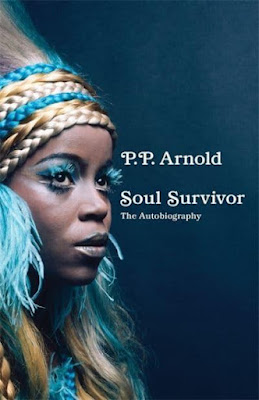On the one hand, P P Arnold’s memoir is quite a hard book to read. Because it’s set in the music business in the 1960s and this, from the point of view of a very young, very naive black girl, was a hard place to thrive in.
On the other hand, it is a good read. Because it’s set in the music business in the 1960s and full of interesting tales. Specifically, a big part of it is set in Swinging London where Pat Cole (her real name) hung out with the Rolling Stones, the Small Faces and Jimi Hendrix.
There is a lot of sex and drugs and rock’n’roll. There is also a lot of male violence and abuse.
A few years ago, I set out to read as many books by women in music as I could. I’ve read a lot (I haven’t had time to write about them all), and one thing surprised me: how many #MeToo moments there are in the stories. Some are connected with the music business, and some are domestic (in which case they are sometimes the reason for escape into the music business).
In Pat’s case, she was in an abusive marriage before she began her career as a professional singer working for Ike and Tina Turner. And that led to abuse of a different kind.
The story about Ike Turner is the most shocking, but there are other incidents with other men. Going through these, and coming out the other side, is one way of being a survivor. Another way is picking yourself up and starting again when your career trajectory is more episodic than meteoric.
Pat’s first career break was working as an “Ikette”, backing Ike and Tina Turner. Even the name tells you how patriarchal the system was, and when she joined the group she could tell that she was being groomed to be a clone of the Ikettes who had gone before (you just had to wear similar wigs).
After escaping Ike, she fell into the British music scene as “The First Lady of Immediate”, having hits with Angel of the Morning and First Cut is the Deepest. It’s also when she got her stage name (Arnold was her married name, and “P P” was Andrew Loog Oldham’s idea).
Later she worked as a session singer and performed in stage musicals. The book ends rather randomly with Starlight Express in 1982; there’s an epilogue which skates through what’s happened since, including a 21st century comeback.
The episodic nature of the story makes it hard to follow at times: there are strings of lovers and husbands, house moves and record deals, most of which don’t work out so it’s on to the next thing. The only constant is her children, and how important they are to her. Not very rock’n’roll, but a central part of many women’s stories.
The writing style can be a bit flat, which also makes it hard to read (it feels ghost-written, although I don’t think it is). But there are sparks of sharpness that I would like to have heard more often. On Mick Jagger: “he was hilarious, with his gangly white-boy sex appeal, trying real hard to look black – but sticking out his chest and flapping his arms like a rooster in the barnyard.”
The London years are the most fun to read about, especially as these chapters come with a large amount of showbiz gossip (and famous boyfriends). It’s clear, though, that 1960s London might have been “colourblind” and “cosmopolitan” but it was still sexist. Playing the part of a “psychedelic rock chick” was a culture shock. And when Immediate went bust, Pat was back to the starting line again with no management, no label and not much to show for her pop stardom in the way of money.
This isn’t just about music history; there is a lot of social history too, particularly about African American lives. The book includes family history: stories that go back to slavery. And it describes in eye-opening detail the realities of life on the road in the segregated South in the 1960s, something that came as a shock to Pat herself with her background in Watts, Los Angeles.
“In LA, we had our own communities and didn’t mix much. In the south, black and white mixed more, but only because the former worked for the latter.”
She is equally clear-eyed when describing the atmosphere of sexism and male violence that she grew up with: she sees it as a result of a repressive system that “created untold anger within the black male psyche.” That’s reflected in the music business too: “The whole industry was and still is mostly controlled by men.”
That is true of Pat’s career. After Ike Turner, she was at the whim of other male decision makers: Andrew Loog Oldham, Robert Stigwood, Barry Gibb, Jack Good and others, often with disappointing results. The most successful and memorable part of her career was working with Immediate, but even then she had little control over either her domestic arrangements or her business, and that is a recurring pattern.
Despite all this, there is an optimistic spirit in the book, and a woman who doesn’t give up. The title isn’t just a nice pun: P P Arnold is a true survivor.
Soul Survivor is one of six books by women that were longlisted for the Penderyn Music Book Prize 2023. Read about the rest of them here.

No comments:
Post a Comment